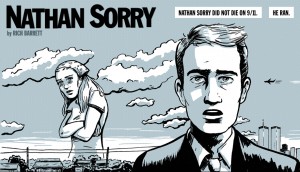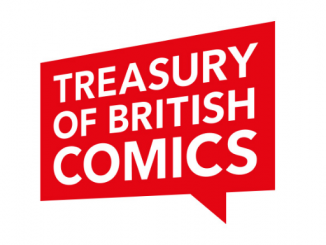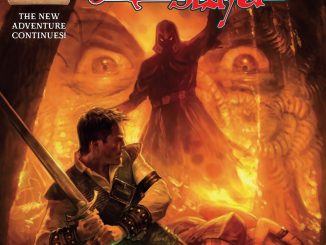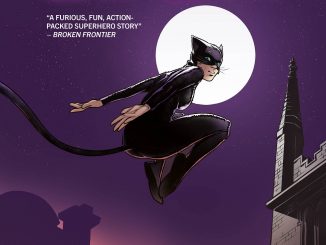
1. Who are you and what are you working on right now? (2 questions in 1, I know!)
Rich Barrett. I’ve been working on my first graphic novel, NATHAN SORRY, for the past couple of years. I post a page at a time on http://www.NathanSorry.com. I’ve completed over 120 pages so far. Enough to release the first two volumes in both print and digital formats. I expect it to be close to 300 pages when finished.
2. What drew you to digital comics?
I think like a lot of self-publishers, I’ve been anxious for this format to take off. I dabbled in it early on – publishing with Graphicly, and the short-lived Illustrated Section – but have held off a bit in the past year waiting to see how things settle out. The landscape for this changes dramatically every few months and its hard to say what will or won’t stick but I think digital holds a lot of promise for independent authors.
3. Webcomics or digital comics?
Both! I think they are very different formats that serve different purposes for different types of comics. As someone who is working on a longer read like NATHAN SORRY, I’ve always thought of the webcomic as probably more of a promotional vehicle than as the primary way of reading the story. Though I have a lot of regular readers and I greatly appreciate those who follow along page by page, I’m aware that it is not the ideal format for reading this kind of story.
What the webcomic format is ideal for is giving you a taste of the comic and letting you decide if it’s something you’d like to come back and read in larger chunks or go ahead and buy it when an installment is ready for purchase either in print or digital. Obviously this is not the case with comics that are written in small installments and certainly a lot of longform webcomics have avid, regular readers, but for most its hard to make that format work for them.
Even when digital might be better suited to the nature of your comic it also has some drawbacks, the biggest being that it doesn’t have the viral or sharable nature that a webcomic has. Digital comics are trapped in a silo and without an open format like a webcomic for promotion, it’s hard to get the word out about it.
4. What do you think works with digital comics?
I always thought digital comics would be ideal for longer graphic novels and although I think that’s probably true, the more I read digital comics myself I find that I’ve gone back to enjoying smaller, comic-sized (22 or so page) installments. It’s possible that both digital and web reading just better fits short attention spans. I like that people are starting to branch out a little from the typical page-counts of traditional comics but I’m not sure yet what’s ideal and what, if anything, might be the threshold.
I think what really makes digital comics highly enjoyable is the coloring. I think we’re in a golden age of comics coloring now and reading a comic on screen is like seeing this artwork in its natural environment. I expect in the next couple of years, some readers will become just as much a fan of a book’s colorist as they are of the person who pencils it. That’s never really been the case in comics before.
As someone who does a one-color comic, reading my own comic on a tablet makes me wish I had the time and skills to make a great looking, full color digital comic.
5. Can digital comics replace print comics?
It will replace some of them I think. And probably a lot sooner than we expect. But never all of them. There are lots of comics out there that look and read better on paper. They really are different reading experiences and it’s hard to imagine one completely replacing the other.
6. How can print comics work with digital comics?
Side by side. Some people will always prefer one over the other so I think it’s good to have both. Though I think it can be argued that making comics to work for both formats is limiting the possibilities of what you can do with either. If you really design your comic to be read on paper or if you design it to be read on a touch screen, there’s so many experiential techniques that you can explore without having your hands tied by making sure it works both ways.
7. What don’t you like about digital comics?
The lack of ownership of digital files on platforms like Comixology which goes against the whole collector-mentality that has driven comic book readers for decades. Although I think the need for ownership of digital files may be slightly overrated anyway. I listen to all my music though Rdio. I watch all my movies through Netflix. And I read most of my books these days with the Kindle. I don’t actually own or hold possession over any of those files and it doesn’t bother me. Digital comics don’t really work the way any of those other services do though. The closest correlation is Amazon except there are a lot of comics out there that I can’t buy on Comixology, yet I can’t buy a comic from somewhere else and keep them all together and read them the same way.
As an independent comic creator, there isn’t really a great way to sell your own digital comics just yet. A lot of people are testing makeshift methods of selling PDFs and setting up shopping carts on their websites but I don’t think the reading or purchasing experience for a lot of these are all that satisfactory. I’m only just starting to research this myself as I get ready to start selling the second volume of my book digitally but I feel like there’s no obvious avenue to follow at this point in order to get started.
8. What digital comics/webcomics do you read?
I’ve been so busy lately that I’ve fallen off reading a lot of both digital and webcomics. As far as digital, I’ve been reading a lot of the Image books lately. Saga, Prophet, Dancer, Thief of Thieves. I’ve fallen behind on so many webcomics but I find I’ve instead been picking up the books when and if they come out instead. Like I said before, this is probably the best possible result for a webcomic anyway. I did this with Paul Tobin and Colleen Coover’s Gingerbread Girl recently (which I loved). I also just bought Jess Fink’s Chester 5000 and I’m looking forward to Cameron Stewart’s impending release of Sin Titulo.
9. Where do you see digital comics going from here?
I think we may see them start to become their own thing as more and more creators start making comics specifically to be read on a tablet. Less constrained by page count, designed for the proportions of the tablet, with art that capitalizes on the luminescence of the screen. In terms of both web and digital comics, I think we’re starting to see people incorporate new technology like HTML5 to create comics that use builds and transitions to great effect without pushing into the dreaded motion comics territory. Readers don’t really want a lot of bells and whistles but I think some of the more subtle uses of these techniques can really enhance the experience the way a book printed on a high quality paper makes you feel a certain way about reading it.
10. Who do you think we should look out for in digital comics?
My friend Christian Sager is a really good writer who is very knowledgable about the business of comics and especially digital comics. His next graphic novel is called The Cabinet and I think he’s going to be doing a lot of great work in the future.
In general though, I think we should be looking out for everyone. A lot of familiar names are breaking away from the typical work-for-hire comics they’ve been doing and are getting into independent publishing now. I love that we’re seeing a lot of them group together with these new digital imprints like Monkeybrain and Offset. Comixology is soon going to be opening their doors to small press and independent publishers. That’s going to make the digital playing field very crowded but it’s also going to probably be the first viable option for real exposure for people publishing their own comics digitally.
“10 Questions With” is to be a interview session with digital comics creators – there’s a lot of great people I’ve got lined up and I hope you enjoy seeing what the creators are interested in.
If you are a digital creator and am interested in participating, please contact me!





